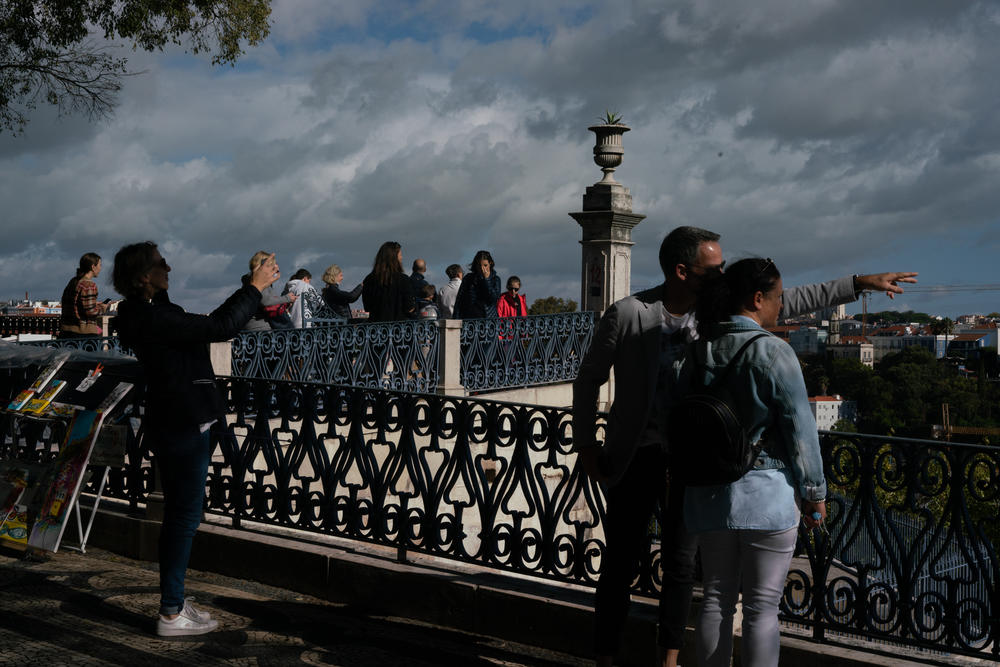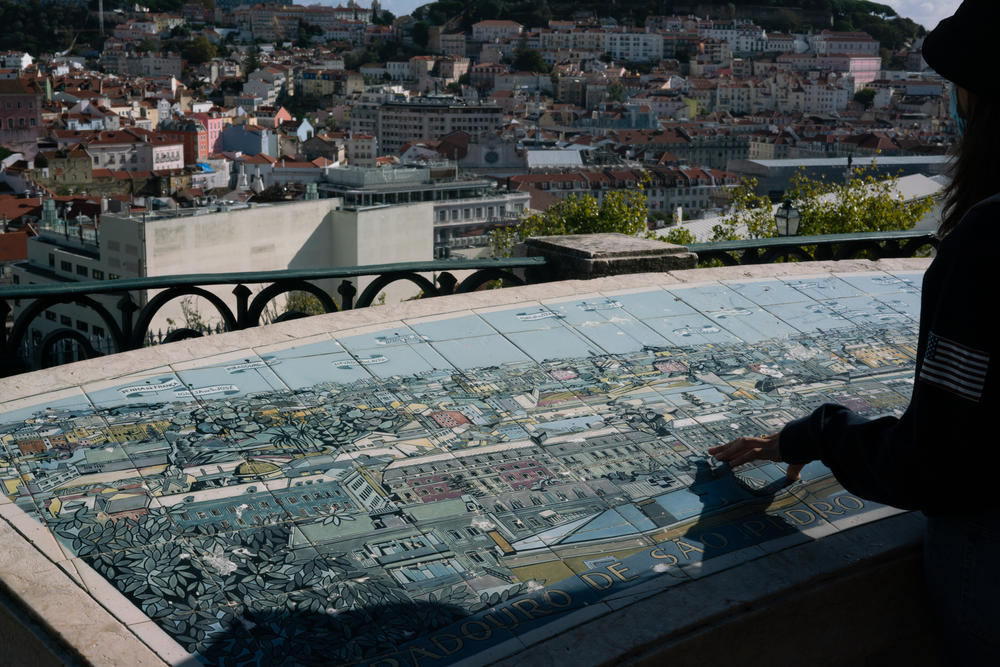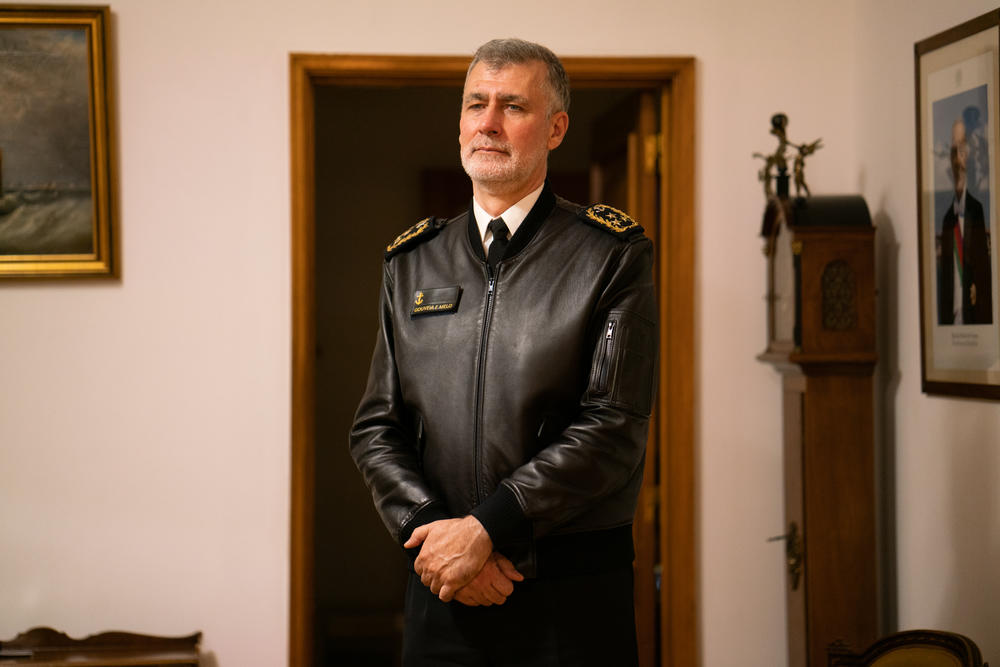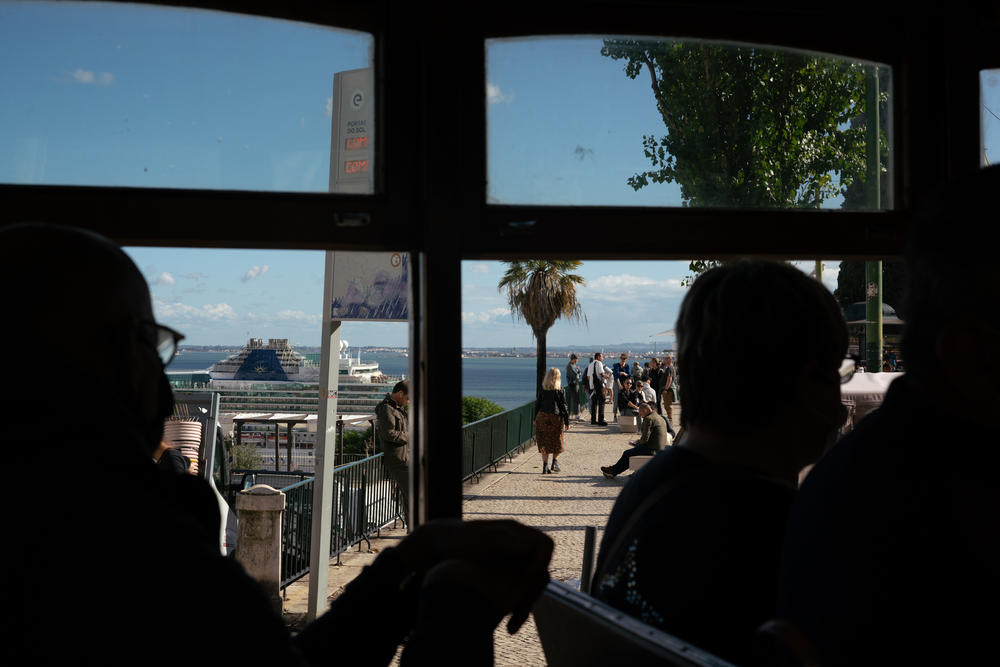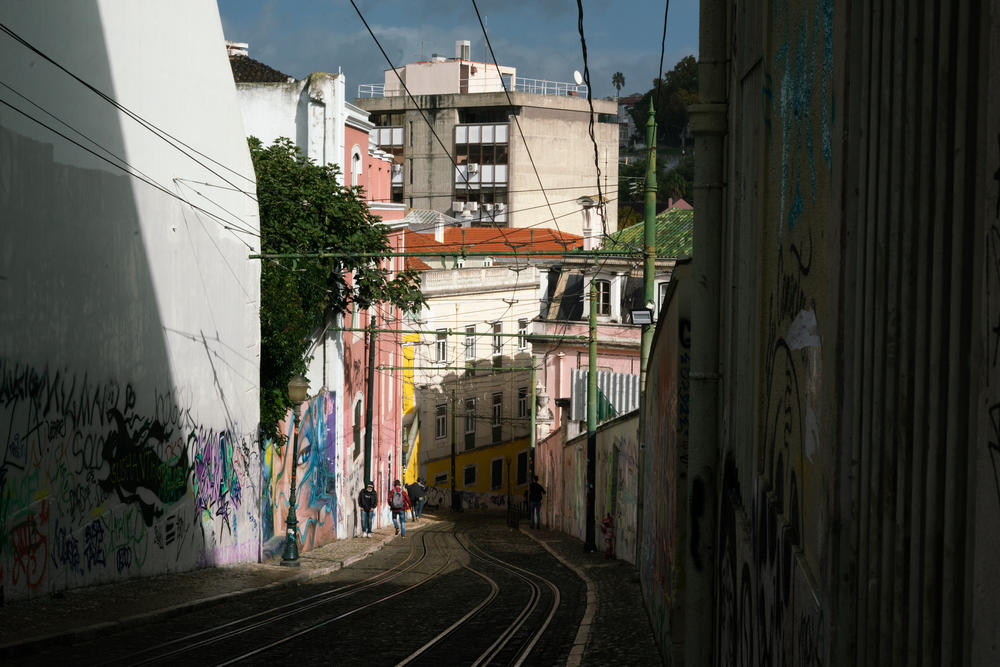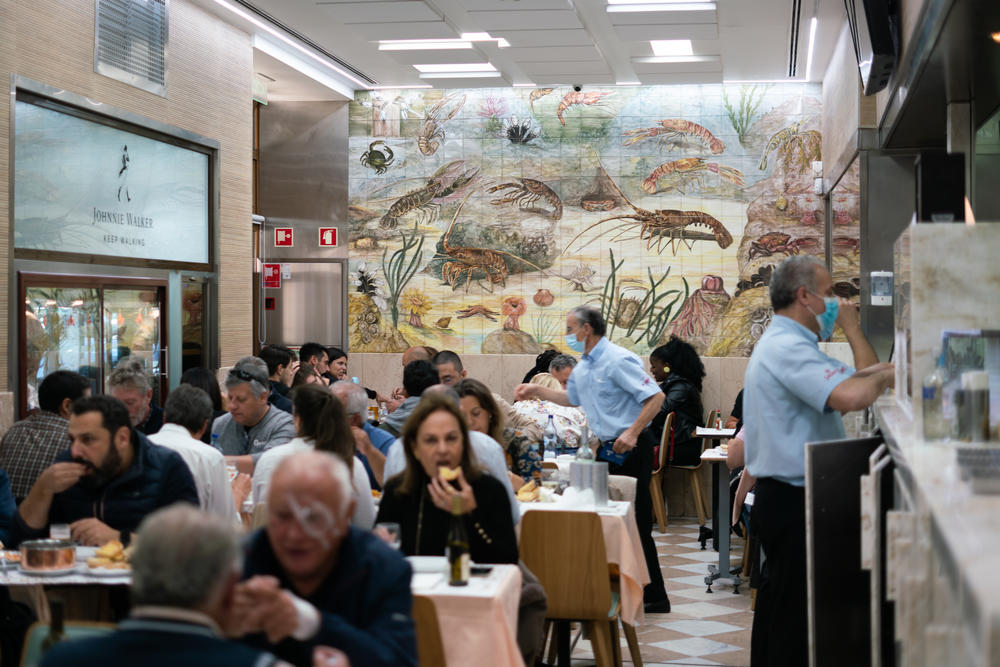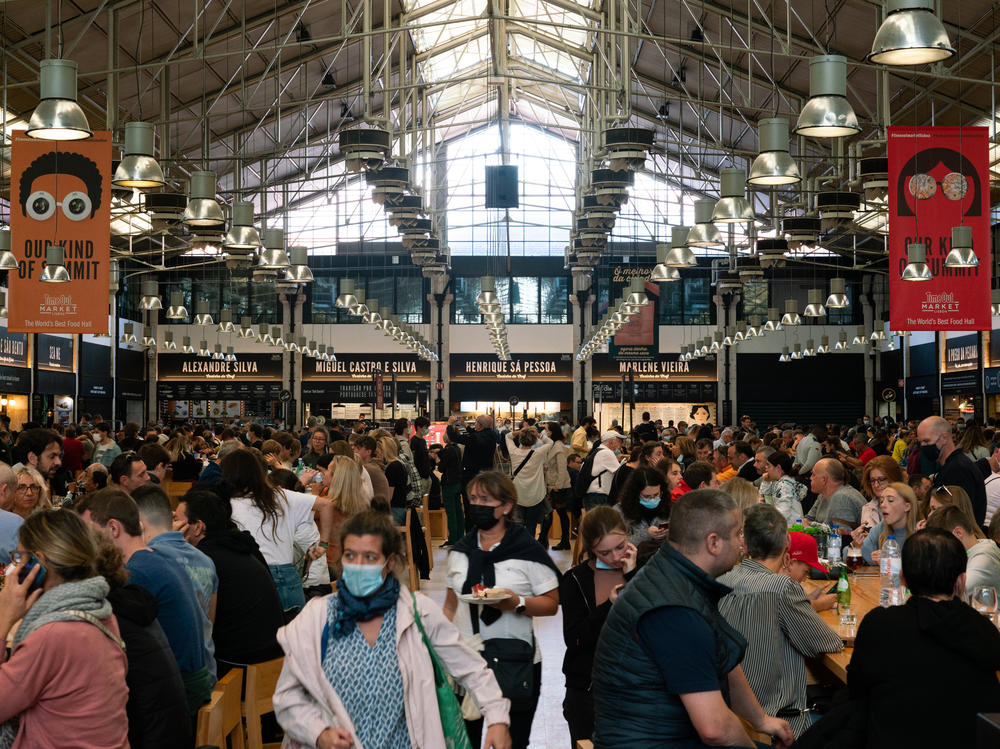Section Branding
Header Content
Portugal has one of the top vaccination rates but isn't taking chances with omicron
Primary Content
LISBON, Portugal — The week the omicron variant hit Portugal, Violante Rocha — 80 years old and triple-vaccinated — masked up and went to the theater.
"Everyone else wore a mask too, of course," she says. "We understand that life is too good to lose. This is how we live with COVID."
Portugal has one of the world's highest vaccination rates against the coronavirus and almost all its adults are fully vaccinated. The shots protect people from serious illness but not from catching the virus. Daily infections have been rising again in Portugal and across Europe.
Scientists are watching how Portugal and other highly vaccinated countries will fare against the coronavirus' new omicron variant.
"Portugal feels a little bit like a lab experiment now," says Maria Manuel Mota, executive director of the Institute of Molecular Medicine in Lisbon. "This virus is not going away. We have tried to prepare for that."
A Star Wars-quoting naval officer reboots the vaccine rollout
Portugal learned this lesson the hard way. A year ago, the coronavirus brought the country to its knees.
The public health system was nearing collapse as ICUs filled with seriously ill COVID-19 patients. As Christmas and New Year approached, the government advised everyone to protect themselves by wearing masks.
"That did not happen," Mota says. "And then, in January and February, we had thousands of people dying."
At the same time, Portugal's vaccine program was in trouble. A hospital administrator appointed to run the vaccination rollout resigned after allegations of unfair access to vaccines and delays in supplies.
Then the government turned over the reins to a high-ranking naval officer. Vice Adm. Henrique Gouveia e Melo showed up for work wearing combat fatigues.
"I said, we are at war, and this is a war against the virus, so what side [do] you want to be on?" Gouveia e Melo told NPR last month, during an interview in his nautical-themed office. You are either "with the virus, 'cause you are crazy and you are helping the virus to spread? Or are you on our side, the community?"
He says be a Jedi against the dark side
The vice admiral, tall and gray-bearded, became a fixture on TV news programs. He used Star Wars references to make his points, comparing those who spread disinformation about the virus to Darth Vader and the Siths.
"They are the obscurantists who use the force for harm ... who are on the dark side," Gouveia e Melo says. "So I say, look, be a Jedi to protect yourself, your family and also all of us."
He says he assembled a "team of Jedis" to lead the vaccination drive. They included doctors and military tacticians who coordinated with municipal leaders and Health Ministry authorities on the vaccination drive. The team helped expand existing vaccination centers and set up new ones in stadiums.
Soon, Portugal had hundreds of COVID-19 vaccine sites administering more than 150,000 shots per day. When Gouveia de Melo visited the centers, those waiting in line for their shots applauded. Once he faced anti-vaccine protesters who were shouting unfounded claims that the shots would end up killing people, even though clinical studies showed the vaccines are safe. The protesters got into his face as TV cameras rolled.
"These guys were shouting like crazy people, 'Murderer, murder! Genocide! Killer!'" he recalls. "And I said in a very calm way, 'Murderer or killer is the virus, together with these crazy people, these people whose minds are still in the 12th century.'"
But there aren't many anti-vaxxers
The naval officer's message worked in part because there aren't many anti-vaxxers in Portugal. Mota, the molecular biologist, says that has to do with the country's history.
"The country was very poor until the '70s," she says. "We had a dictatorship. We still remember high child mortality."
After the four-decade-long right-wing dictatorship fell in 1974, Portugal built a robust public health system. Vaccines eradicated outbreaks of polio, measles and other serious diseases.
"All these anti-vaxxers in other countries like the Netherlands or Austria or Germany or even the United States," she says, "maybe they just forgot what life was like before vaccines."
Life returns but not to the same normal
Almost 88% of Portugal's more than 10 million people are fully vaccinated against the coronavirus, and booster shots are well underway. That's helping life here get somewhat back to normal.
"Well, normal is not the same normal," Gouveia e Melo says. "But at least we are smiling again. We can go out again. The economy is recovering."
When NPR visited the capital, Lisbon, last month, the cobblestoned old town was packed with shoppers as well as tourists photographing intricately tiled buildings.
Lines snaked outside restaurants, including Ramiro, famous for its shellfish and a 2012 visit by the late celebrity chef Anthony Bourdain.
"The people are not afraid to come out," said Ramiro's manager Pedro Gonçalves. "The people start living again."
At another busy restaurant, Christine Bertl, an Austrian biochemist, waited in the chilly night for two hours for a table. She said she chose to vacation in Portugal in part because of its high vaccination rate.
"It's comforting," said Bertl, who is vaccinated herself. "Portugal is a role model to show us that we can relax a little bit and feel safe."
Testing continues, even for the vaccinated
Lisbon has remained lively despite new national restrictions imposed on Dec. 1, in part because of the omicron variant.
They include recommending remote work whenever possible and requiring negative COVID-19 tests for anyone entering bars, sports events and rest homes, regardless of their vaccination status. All travelers, even those who are vaccinated, must show a negative test upon arrival in the country or face hundreds of dollars in fines.
Dr. Graça Freitas, the director of Portugal's health authority, told reporters earlier this month that the government has not ruled out more restrictions this Christmas.
But she said there are far fewer hospitalizations now that most Portuguese are vaccinated.
"It is very different to have new cases than to have lethal cases," she said.
Portugal recently opened its largest vaccination center yet to accommodate children and those getting booster shots. Pfizer says boosters appear to offer at least some protection from the omicron variant.
New variants will appear as long as much of the world is unvaccinated, notes Mota at the Institute of Molecular Medicine
"I know at this point it sounds like a cliché to say, 'We are not safe unless everyone is safe,'" she says. "But it's not a cliché. It's reality, and it's also a warning."
Filipa Soares and Carlota Godinho contributed reporting from Portugal.
Copyright 2021 NPR. To see more, visit https://www.npr.org.
